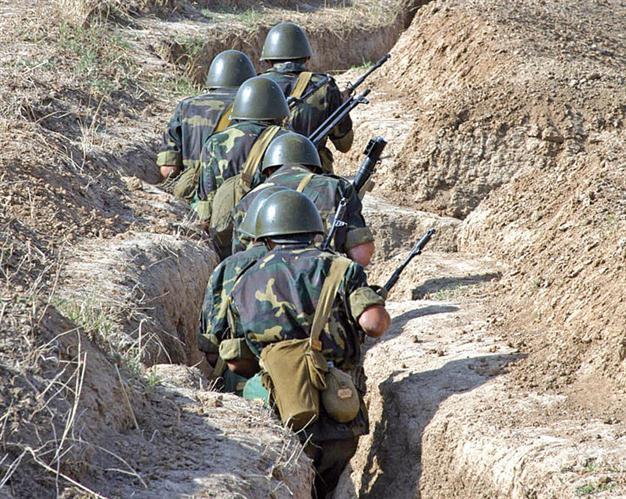Karabakh Azeris ‘need to go’ home
ISTANBUL - Hürriyet Daily News

In this file photo, Armenian forces perform their maneuvers in the self-proclaimed republic of Nagorno-Karabagh about 500 kilometers east of Yerevan. AP photo
The Azerbaijani government has made significant progress in caring for the 600,000 internally displaced persons (IDPs) who were forcibly evicted from Nagorno-Karabakh region by Armenian forces two decades ago, but the ideal solution to the problem is the return of IDPs to their original homes, the International Crisis Group’s latest report has stated.
The report, “Tackling
Azerbaijan’s IDP Burden,” praises government policies in dealing with IDP needs, but emphasized that much more needed to be done, with the problem itself putting pressure on the Azerbaijan leadership to prepare for the possibility of a new war.
“The status quo is neither acceptable nor safe. The right to return for people displaced from Nagorno-Karabakh has yet to be upheld, or an alternative formula agreed, for example based on compensation and exchange. This increases pressure on Azerbaijan’s leadership to threaten military action to retake lost sovereign territory. IDPs consider return their priority and say they are ready ‘to take up weapons to retake our homes’ when ‘Baku gives the word,’” the report states.
“Azerbaijan now claims to spend more proportionately than any other country on its IDP population, 7 per cent of the total population, which itself is one of the highest percentages of IDP populations in the world [...] Though much more is needed to ensure that IDPs lead dignified lives while they await the chance to return to their homes. They (IDPs) should be more effectively integrated into decision-making about housing, services, and other community needs, as well as contingency planning for emergencies and confidence building measures,” it adds.
Policy prescription for all
The report claims there is little likelihood of progress in confidence building measures in 2012 due to elections in
Armenia, Azerbaijan and the OSCE
Minsk Group co-chair countries (France, Russia, U.S.) However, it advises that the Azerbaijan government, authorities and international community take necessary steps to facilitate greater IDP engagement in policies related to their lives. “The Government should involve IDPs as much as possible in housing decisions; and streamline processes for reporting incidents of corruption or violations of state law regarding IDP issues. It should also allow IDPs, while their villages and towns remain occupied, to vote for municipal councils in their places of temporary residence.”
The report includes a section on conditions for those approximately 128,000 IDPs and permanent residents living in close proximity to the 180 kilometers-long line of contact (LoC) that marks the 1994 ceasefire between the opposing forces. It envisages an expanded interim OSCE monitoring role to remove snipers from the LoC and to set up an incident investigation mechanism. “Azerbaijani authorities should agree with the Armenian government and the de facto authorities in Nagorno-Karabakh to an expanded interim OSCE monitoring role to remove snipers from the LoC and to set up an incident investigation mechanism, as well as to immediately cease military exercises near the LoC,” it said.
The international community should facilitate the creation of an incident investigation mechanism, including the operation of a hotline between the sides to discuss ceasefire breaches and develop more on-the-ground confidence-building measures to create an atmosphere of trust. “The very existence of 600,000 Azerbaijani IDPs – still prevented from returning to their homes and land two decades after fleeing the Nagorno-Karabakh conflict – is a clear demonstration of why it is urgent to renew international efforts to facilitate an agreement between Azerbaijan and Armenia,” it concluded.
KArabak,
